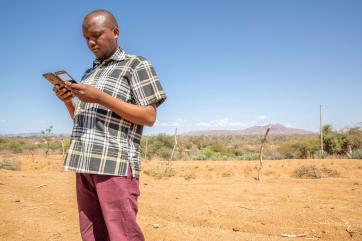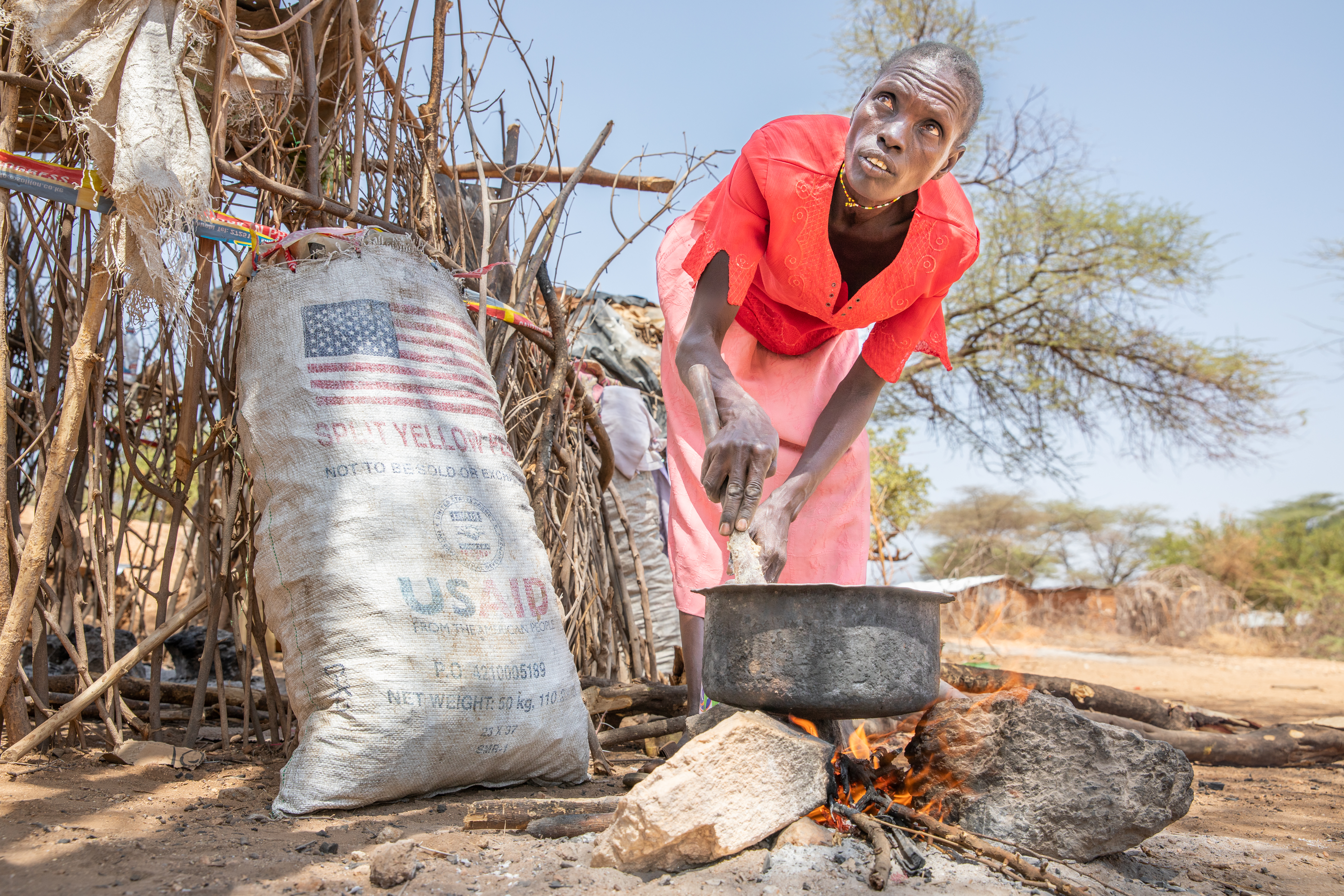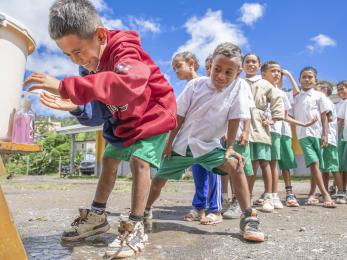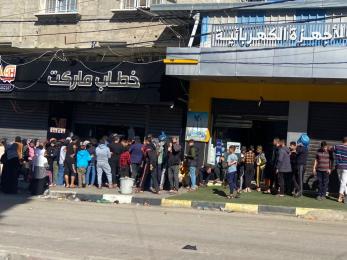4 of the biggest challenges we’re tackling in 2021

2021 will be a critical year for all of us — a test of our resolve to eradicate COVID‑19 and our commitment to addressing its long-term impacts.
We know that COVID‑19 is not only a threat to people’s health and livelihoods today, it’s also amplifying dangerous, complex challenges that threaten the world’s most vulnerable communities for years and even decades to come. Four of the biggest issues Mercy Corps teams will focus on this year include:
- Getting COVID‑19 vaccines to everyone who needs them will require an unprecedented effort to build trust within communities wary of their governments.
- Disrupted supply chains will continue to threaten the precarious livelihoods of small farmers, further limiting access to nutritious food for millions who are already hungry.
- Misinformation will intensify existing conflicts and undermine public health efforts in communities where safety is a daily concern.
- The economic impact of lockdowns will make it even harder for young people to find employment and for small businesses to survive.
The scope and scale of this new reality will take shape in 2021, requiring collaboration across cultures, governments, and humanitarian aid and development organisations. The United Nations predicts 235 million people will need humanitarian aid in 2021, up 40% from 2020.
Mercy Corps teams around the world are already working with partners and people in the communities we serve to tackle these challenges and uncover new opportunities to create a brighter future, where everyone has a chance to prosper.
“If we don’t act together as a global community of humanitarians, we risk leaving an entire generation of the most vulnerable behind,” says Mercy Corps CEO Tjada D’Oyen McKenna.
Stopping the spread of COVID‑19 in vulnerable communities

News of promising COVID‑19 vaccines gives us all reason to be optimistic, but people in low-income countries and refugee communities are likely to be among the last to receive them. Transporting and distributing vaccines around the world will create a massive logistical challenge, but that’s just part of the equation. Mass vaccination will also require a coordinated, collaborative effort to build trust in the vaccine and the governments who will provide it, particularly in areas mired by conflict and chronic poverty. With Mercy Corps’ decades of experience building relationships within communities in over 40 countries, we have a critical role to play in the global vaccination effort.
At the same time, we’ll continue helping people stop the spread of the disease, with handwashing stations, hygiene kits, sanitation training and public education campaigns to promote day-to-day safety.
With support from a grant from Twitter CEO Jack Dorsey, Mercy Corps teams in Colombia, Haiti and Puerto Rico will be able to provide emergency cash to 4,500 vulnerable families, and reach 500,000 people with campaigns to provide accurate information about COVID‑19 prevention and treatment.
“In 2021, we’ll continue to provide emergency cash assistance and support for post-pandemic recovery. We must do everything we can to alleviate the suffering caused by this pandemic.”
‑Hugh Aprile, Mercy Corps Country Director, Colombia
Helping small-scale farmers adapt to climate change and feed millions
For small-scale farmers, COVID-19 intensifies the already severe impacts of the climate crisis, not only for the farmers’ livelihoods, but for the millions of people they feed.
As rural producers struggle to get seeds, fertiliser and other agricultural resources, local markets have shut down, travel has become difficult, and the credit farmers need to bridge the gap has grown scarce. The World Food Program warns that the number of people experiencing food insecurity could increase by 82% — an additional 270 million hungry people — in 2021, 50% of whom are small-scale farmers.


Mercy Corps’ AgriFin programme helps small-scale farmers adapt to the impacts of a changing climate and shocks like COVID‑19 by providing access to data and insights to help respond to unpredictable weather and pests, as well as digital financial services to keep their enterprises afloat. To date, 5.5 million farmers in seven African countries and Indonesia have accessed digital products and services through the programme. In 2021, the programme will scale to reach 16 million, with a focus on small-scale farmers in Kenya, Nigeria, Tanzania, and Ethiopia.
“Digital financial and information services have proven to be low-cost, scalable technologies for reaching many farmers over multiple contexts quickly, and will be critical to ensure food security in 2021.”
‑Leesa Shrader, Programme Director, AgriFin
Debunking dangerous rumours and building trust
In countries where violent conflict and political division impact daily life and governance, the pandemic is likely to exacerbate tensions and disrupt crucial peacebuilding and humanitarian aid efforts. According to one forecast, 13 countries are likely to experience new conflicts in the next two years as a result of the pandemic and government responses.
In Nigeria, long-standing political grievances and mistrust of government have grown stronger because of misinformation about the pandemic. Rumours about faulty COVID‑19 testing equipment or false claims that the virus is a hoax perpetrated by corrupt politicians have spread, sowing division and skepticism. As a result, public health measures have been ignored or resisted, and humanitarian aid distribution has become politicised with claims that certain groups are favoured while others are excluded.

To push back against misinformation, Mercy Corps has piloted a rumour and myth tracker in the state of Borno in northeastern Nigeria, which includes more than 1.6 million displaced people living in environments where a lack of social distancing, poor nutrition and sanitation, and widespread conspiracy theories about the pandemic create a deadly combination.
The tracker uses mobile phones and radio to understand the rumours being spread and then tailor educational campaigns for specific communities, addressing their perceptions and questions about the virus. It will also inform our ongoing training and engagement sessions to promote healthy dialogue between local communities and government representatives — with social distancing and other preventive measures in place — to increase civic engagement and build trust.
“Mercy Corps understands the dynamic in the conflict-impacted communities where we work. This puts us in a unique position to develop locally relevant, culturally sensitive programmes to reach people most in need.
‑Ndubisi Anyanwu, Mercy Corps Country Director, Nigeria
Reviving local economies with young talent and small business support
Around the world, lockdowns and shrinking sales as a result of the pandemic are causing businesses of all sizes to close, downsize, or reduce costs wherever they can. Small businesses and informal workers who work outside of established employment structures — many of whom are young people — are likely to be impacted the most, without savings or safety nets to help them weather the crisis. The International Labor Organization predicts a loss of 305 million full-time jobs globally, and a 60% decrease in income for informal workers.
In Jordan, for example, lockdowns have been catastrophic for gig workers and workers who are paid wages by the day, without the long-term protections of a salary or employment benefits. The lost income from just one day a week can mean losing access to basic needs like food and health services.

Mercy Corps is working to better understand how demand in the job market has changed because of the pandemic in Jordan, as well as in Tajikistan, Iraq, Niger, Kenya, Lebanon and Liberia. We’re using what we learn to partner with technology companies and social enterprises to develop digital tools that help young people find promising jobs, start new businesses or build the skills employers are looking for now. In 2021, we’ll help 341,000 young people find safe, stable employment, with a goal of reaching 1 million by the end of 2024. At the same time, we’re helping small businesses recover and adapt to the new economic landscape.
“2021 will be a ‘make it or break it’ year, but there is still potential for economies to recover. Mercy Corps’ role in working with businesses to navigate risks and capitalise on opportunities is more critical than ever in 2021.”
‑Kari Diener, Mercy Corps Country Director, Jordan
Together, we have the power to reshape the world

As we enter 2021, the world isn’t just dealing with multiple challenges — we’re dealing with interconnected ones. We don’t have the luxury to deal with them one at a time, and no single organisation can solve any of them alone.
That’s why, at Mercy Corps, we take a holistic view. We look at the root causes of each crisis, as well as the connections between them, to understand how they impact the world’s most vulnerable people. We then collaborate with partner organisations, governments, private companies, and most importantly, people in the communities we serve, to develop practical, long-term solutions.
In the process, we not only find ways to remove obstacles to peace and prosperity, we uncover new possibilities to create meaningful, lasting change.
“Amid all of the challenges the world continues to face in 2021, we also have an opportunity to reshape the world for the better. Seizing that opportunity requires all of us to come together to build a future everyone can share.”
‑Mercy Corps CEO Tjada D’Oyen McKenna


